18 Feb 2019
Travel Impact Newswire Editor quits PATA membership. Here’s why.
Bangkok – This year, PATA began its third decade in Asia. I marked the occasion by terminating my membership. It was not an easy decision, but one I feel will actually benefit PATA over the long run.
Everyone joins an association, or any club or organisation, for a reason. Mostly, it is to grow a business, expand connections, monitor trends, etc. In my case, it’s none of the above. As a journalist, historian and long-standing PATA-watcher, I seek to be intellectually nourished, monitor the forces of change and chronicle tide-turning moments. I enjoy well-argued debates, absorbing new ideas and listening to people battling for righteous causes. I believe societies, organisations, communities and companies emerge stronger via critical thinking, democratic dust-ups and anti-establishment viewpoints.
Today, PATA events are devoid of any of that. Measured against the world-class events of the past, which I was fortunate to cover up close, the current roster is downright brain-dead. And that is downright unfortunate. In these exciting and challenging times for the world and the Asia-Pacific, the formidable regional travel & tourism industry can play a vital role in creating a more stable, sustainable, fair and balanced new global order. For years, PATA was a formidable Voice of the region. Its conferences and events sizzled with creativity and energy as it sought to hoist the travel & tourism flag across the region. Today, it is failing miserably.
In his letter of 4 Oct 2018 requesting a renewal of my membership, CEO Mario Hardy said, “With your continued support and active participation in the Association, we will be able to carry on our work towards our mission to act as a catalyst for the responsible development of travel and tourism to, from and within the Asia Pacific region.” He encouraged me “to take full advantage of the member benefits available to you to help you build your network, people, brand, and insights.
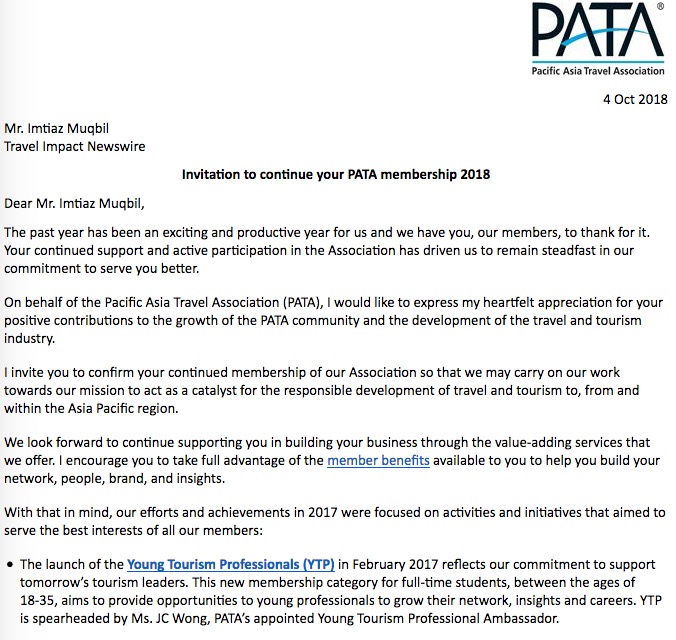
He outlined several PATA activities and initiatives “to serve the best interests of all our members” e.g., launch of the Young Tourism Professionals (YTP), the PATA Membership Directory, a PATA thematic video which “encourages viewers and the tourism community at large to reflect on their inspirations for travel, as well as aspirations for protecting the Asia Pacific tourism industry,” the PATA Travel Mart, the launch of a Speakers Bureau and events such as the PATA Adventure Travel and Responsible Conference and Mart and the PATA Annual Summit.
He said PATA “will continue to seek opportunities for our members to expand their network, foster meaningful partnerships, share their knowledge and expertise, and learn more about key topics that are shaping our world today. Your continued patronage and suggestions are a vital part of our growth.”
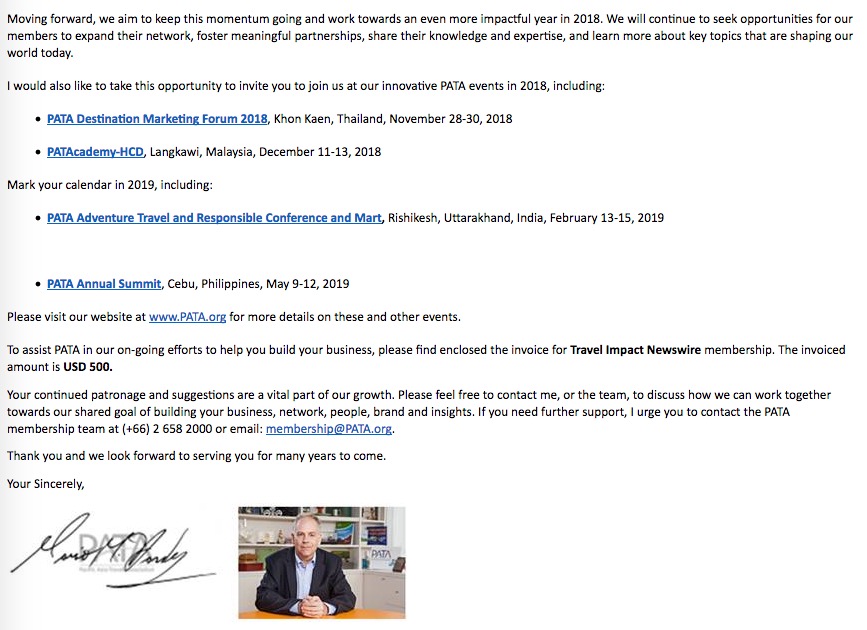
This last para is key, especially the reference to “key topics shaping our world.” Indeed, rewinding the clock 20 years will prove how PATA became a victim of the “key topics shaping our world” and is still not taking adequate cognizance of them.
When former PATA CEO Joe McInerney took over in 1997, it was just after the devastating Asian economic crisis. In his December 1997 self-introductory letter to members, he said, “Our Association is steeped in history and is a unique progressive force among travel & tourism associations. As a collective group, PATA has opened the doors of progress for the region, and is well-positioned for the next century.” He said the staff “is looking at ways the Association can help you successfully ride the economic downturn.”
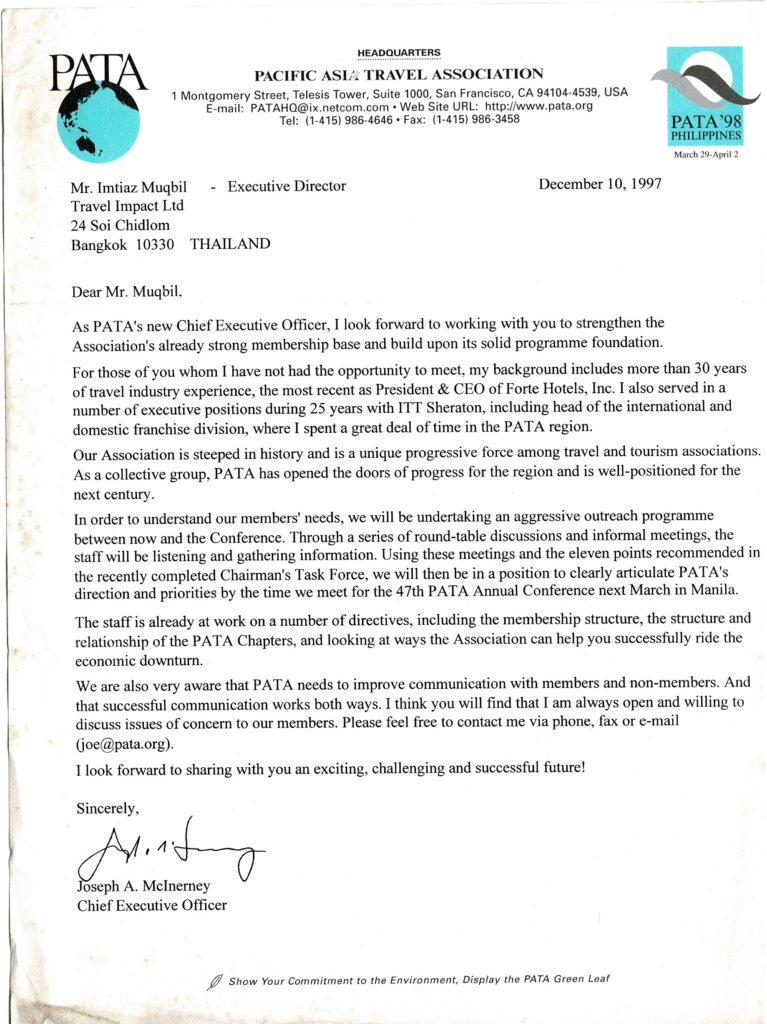
In early February, 1998, Mr McInerney attended his first board meeting as PATA CEO in Cairns, Australia. He reported to the members thus: “With the current economic situation throughout much of the Pacific Asia region, I wasn’t certain what to expect. I am happy to report that I left the meeting even more enthused about the future of PATA, our region and industry.”
He said the Board had “approved an aggressive, pro-active business plan … to bring greater value” to the membership. He said members had expressed “an interest in adjusting the 1998 PATA Annual Conference programme to better address business needs in light of the economic downturn.” Pledging action for campaigns to end child prostitution, Mr. McInerney cited this as “the first example of what will become a more pro-active PATA, taking stands on issues facing our region and industry.” Also on the table was the relocation of PATA HQ from the United States to Asia. The footnote on his letterhead urged PATA members to “Show Your Commitment to the Environment, Display the PATA Green Leaf.”
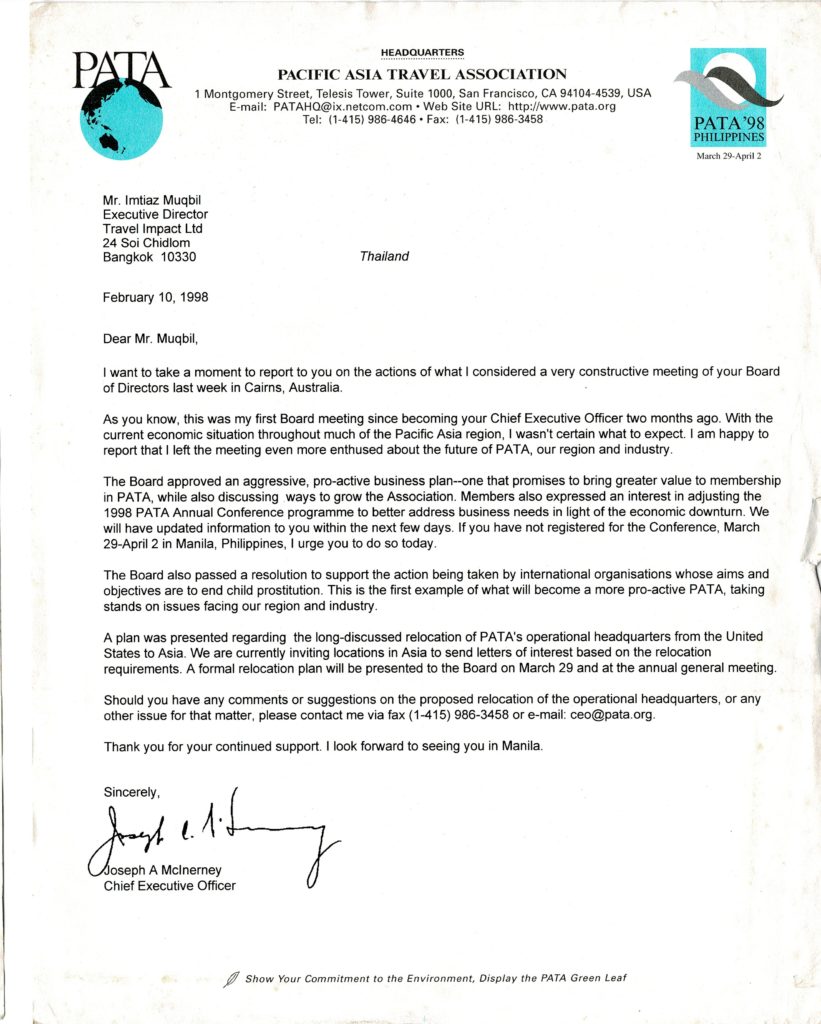
Today, 20 years later, child prostitution is still rampant. Green Leaf has ceased to exist. PATA’s “aggressive business plans” and other grandiose strategy documents such as “Direction 2000” achieved nothing.
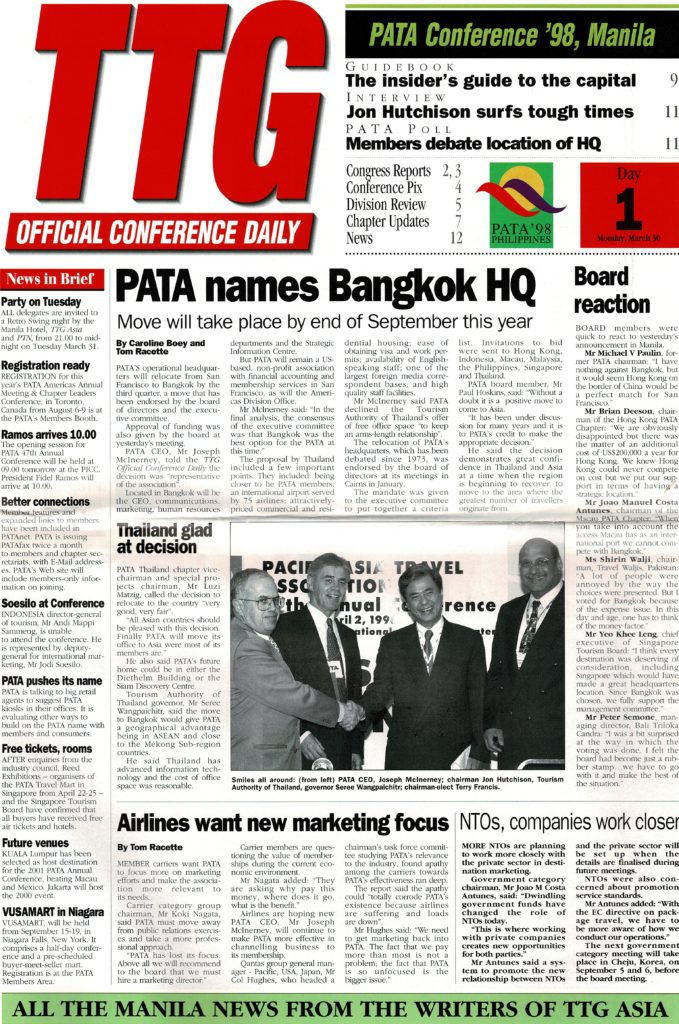
After the move from San Francisco to Bangkok, Mr. McInerney made several public statements noting that “the view” from the 28th storey of a downtown Bangkok office tower was markedly different than the “view” from San Francisco. He was not referring to the skyline. Rather he was recognising the importance and challenge of being in the heart of Asia, with all its ups and downs. The 1997 economic crisis had rendered toothless many of the former Asian Tigers, including Thailand. Conversely, the world’s two populous giants, India and China, were rising. Tourism was seen as being a part of the solution for many countries.
Mr. McInerney’s views about the future of post-move PATA were comprehensively covered in this interview with my respected colleague James Ruggia of Travel Agent magazine. Along with many other documents, I have preserved it carefully for the benefit of emerging generations who may be keen to learn the lessons of history.
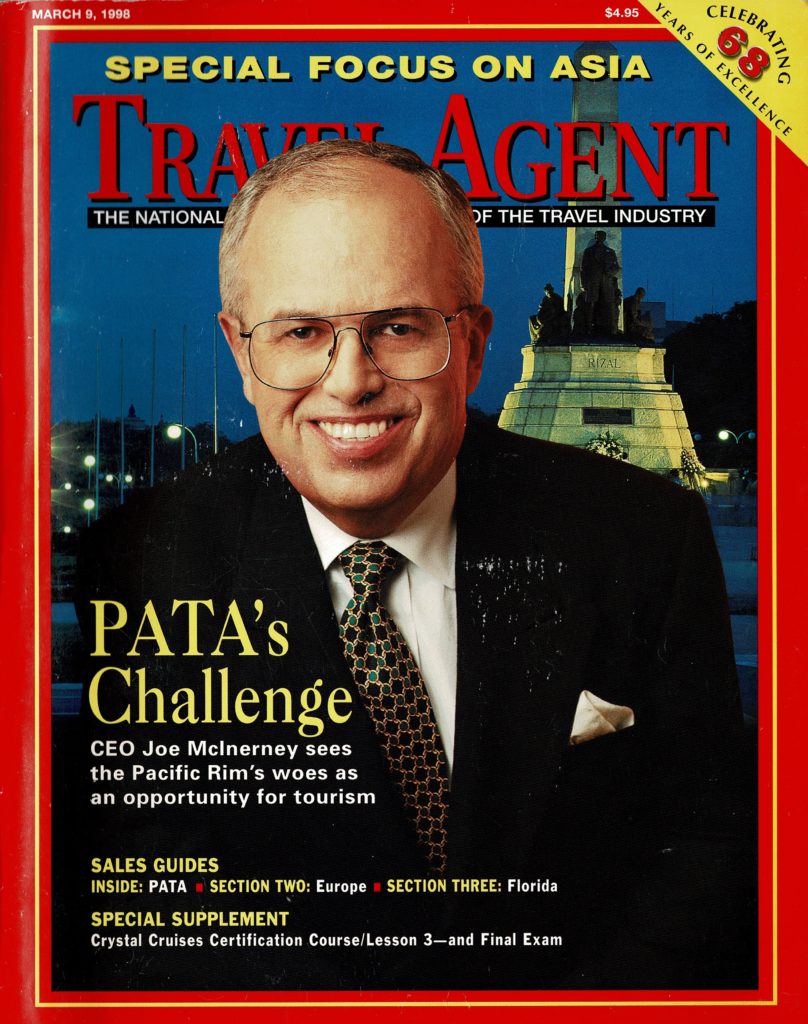
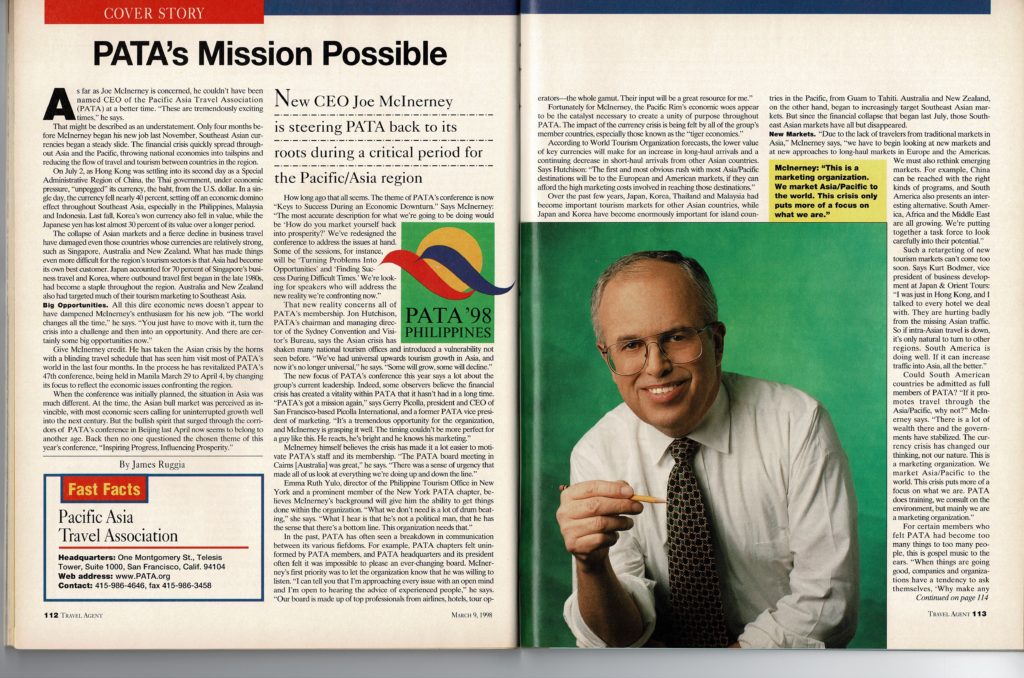
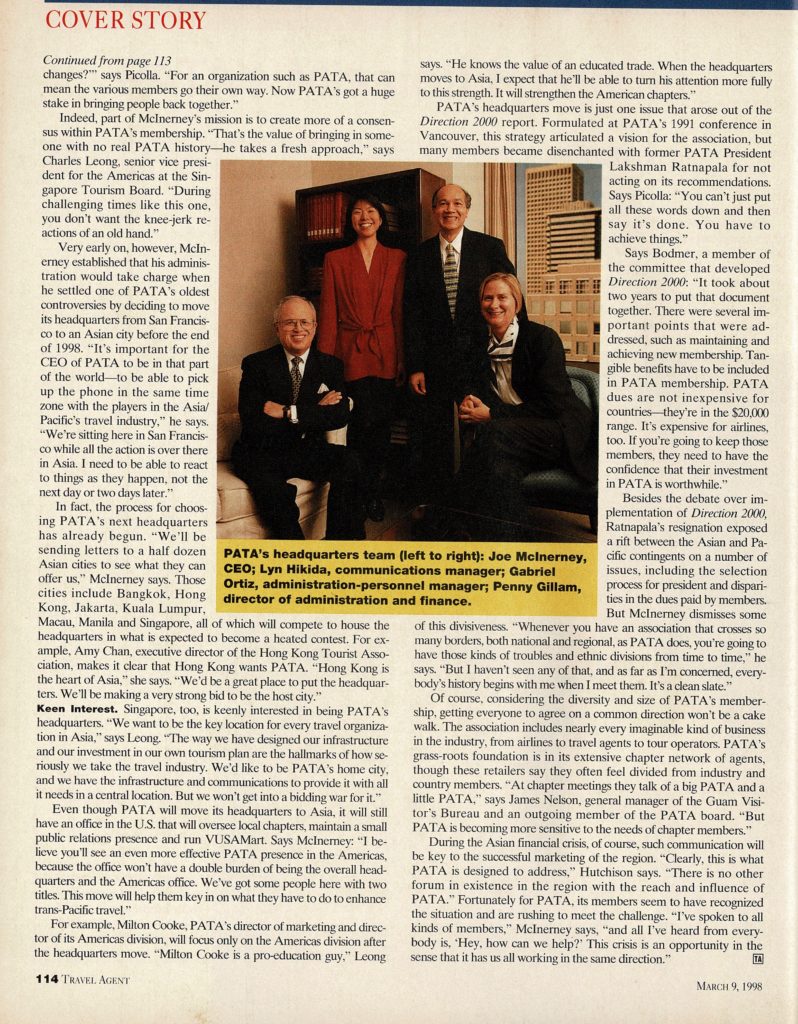
In 2001, just a few months before the 9/11 attacks, Mr. McInerney announced that he would be leaving PATA to return to the U.S. His timing was perfect. What followed was decade of tumult. In Thailand, ASEAN and across Asia, the first decade of the 21st century was marked by continuous convulsions, including the political strife in Thailand and the Boxing Day 2004 Tsunami. The “view” no longer looked as rosy as it appeared before the move.
For all its self-proclaimed bluster about being the “Voice” of Asia-Pacific tourism and an association “steeped in history”, post-move PATA’s responses always fell short. As numbers dwindled, it lost both its sense of purpose and direction. The annual conference, once a must-attend event, fell by the wayside. The PATA Travel Mart, another showcase event, was edged out by the Singapore-based ITB Asia. The far-flung and once-formidable chapter network shriveled.
An honest forensic analysis of PATA’s decline will expose many reasons for its contraction. One of the most important is that PATA events became forums for preaching to the converted. Erroneous diagnosis led to erroneous solutions. The unwieldy decision-making structure didn’t help. Although every crisis creates an opportunity, PATA bungled them all.
Today, the association is taking advantage of a four-year lull in local, regional and global crises to rebuild its fortunes. Financially, it is succeeding; there is no shortage of the converted willing to listen to the same old preachers. But intellectually, it is stagnant. The twin pillars of its agenda, technology and sustainability, are both run-of-the-mill topics that can be found anywhere. Both are being addressed within the traditional comfort zones, devoid of alternative perspectives and critical analysis. The “old boys club” has been replaced by a club of young technobabblers and start-ups, with no sense of history. The focus is always on “the future.” The past is just that.
At PATA forums and seminars, the interactive human-touch Q&A has been replaced with the new Sli.do system. PATA staff double up as moderators, which sinks panel discussions to the level of “Yes Minister.” Full contact details of event delegates are no longer released “to protect their privacy”, thanks to the European GDPRS. “Overtourism” is a looming threat. Yet, the annual Asia Pacific Visitor Forecasts brags about continued growth in visitor arrivals, with more growth coming.
PATA membership does not reflect the new realities. In the good old days, members proudly cited PATA as the only global travel trade association at which all individual sectors, NTOs, hotels, airlines, tour operators, etc., had a seat at the table. Today, travel and tourism stakeholders include environmentalists, labour unions, NGOs, human rights campaigners and other such activists who seek to bring a check-and-balance mechanism into the system. So far, they have no “Voice”.
Perhaps most important, PATA lacks a comprehensive appraisal of what Mr. Hardy himself calls “the key topics shaping our world” and how PATA and travel and tourism can be a part of the solution, or at least become a platform for reasoned debate of such solutions. Old-hat solutions — such as “dispersal” — have little relevance to the broader forces of change. Its board and committee members claim to be visionary thinkers. If asked why they failed to put their own house in order, they tend to blame everyone except themselves.
Mr. Hardy wants members to “share their knowledge and expertise.” That does not include historians who raise awkward questions and remind PATA of its failings. This comparison of the two CEOs’ letters to members, 20 years apart, provides a good benchmark of how PATA has fallen short. In spite of being hit by waves of economic, geopolitical, environmental and socio-cultural tsunamis, it is still ignoring the well-tested dictum, “Those who do not learn the lessons of history are doomed to repeat it.”
I hope to see that change one day. I am sure it will. Until then, I will park my membership fees elsewhere.
